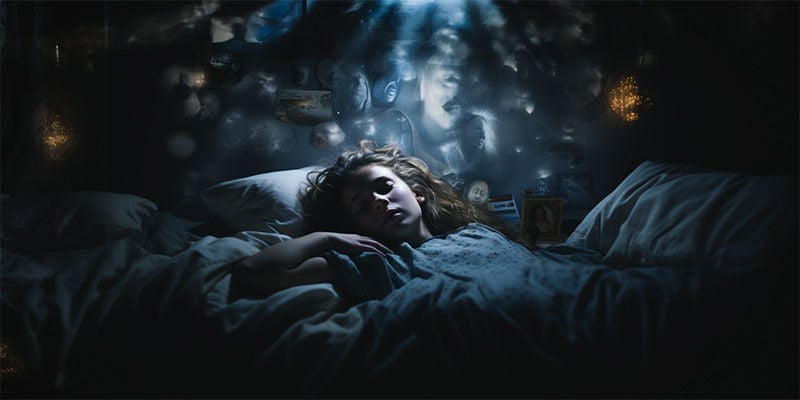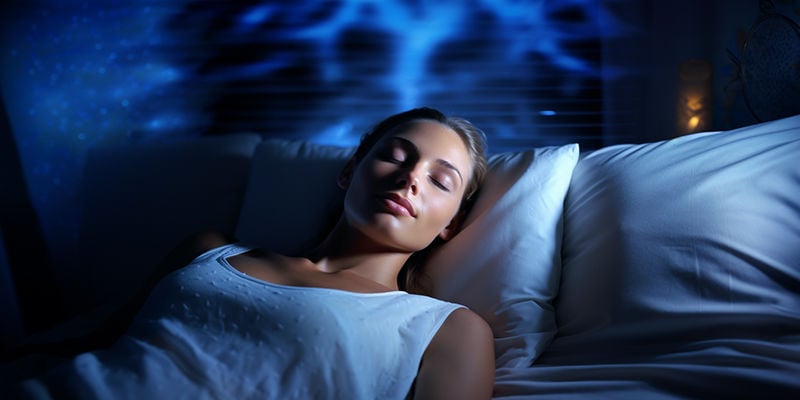
How To Cure Nightmares And Self-Heal With Lucid Dreaming
We've all been there; waking up from a bad dream can not only impact our ability to fall back to sleep, but also our mood and productivity the following day(s). However, there's no reason to let nightmares affect your waking life. Through self-healing techniques and lucid dreaming, it's possible to bounce back quicker than you'd think!
If you thought nightmares were reserved for children, you'd be wrong. While they may not be as common during adulthood, that's not to say that they don't happen. It's no secret that any disruption to your sleeping pattern can not only cause distress at the precise moment of waking, but can also impact the following day(s) too. But by using methods such as self-healing and even lucid dreaming, could it be possible to tame bad dreams and function at your best during waking life?
What causes nightmares

During childhood, it doesn’t take much to influence an impressionable and imaginative mind. So watching a horror movie or getting spooked by the thoughts of monsters in the cupboard are bound to play on a child’s mind when falling asleep, often resulting in nightmares. As adults, we typically outgrow this mentality and can rationalise these situations, so why do we still experience nightmares throughout our adult life?
In adulthood, nightmares are much more spontaneous, and there are various causes for them. Something as simple as eating late in the evening can kickstart your brain into becoming more active, resulting in nightmares. The same can be said for the use of alcohol and drugs. Sometimes it can be the stress of daily life, or there can be more complex issues at hand, such as PTSD and even depression; simply put, there is no one cause of nightmares in adults.
The impact of nightmares on well-being
Of course, waking up distressed in the middle of the night is not going to be helpful when you need to be up in a few hours for work. Plus, nightmares typically occur during the early morning hours, when REM sleep concentration is at its highest (Edwards, 2015). While most of us are able to shake off the experience following a nightmare and fall asleep again, the event can have a lasting effect on well-being. Particularly if they occur frequently, nightmares can cause sleep deprivation, which can lead to a host of potentially negative effects on a person's daily life.
What is self-healing, and how can it help with nightmares?

It might sound self-explanatory, but self-healing is the process of recovering from both physical and emotional challenges through a series of self-imposed practices. This could include breathing exercises, meditation, or changing up your diet. The list is pretty endless. For example, if you feel sleep-deprived or tense throughout your workday, pounding energy drinks and eating junk food could potentially exacerbate things. Making the switch to herbal tea, eating a healthy snack, and meditating could very well be the ticket to feeling much better in yourself.
This same ethos can be carried over to dealing with nightmares. Preparing yourself mentally and physically before heading to sleep could make all of the difference. For example, listening to some soothing music, or even using positive visualisations, could put a dampener on those nightmares before they've even happened.
Tips for self-healing
As mentioned, the options are plentiful when it comes to self-healing. Something as simple as changing your diet up a little could sustain a substantial impact. For example, try to avoid eating large meals right before bed, as some people find this to increase the occurrence of nightmares. Other possible techniques include breathing exercises, starting a gratitude journal, using relaxing herbs such as chamomile, or exercising during the day. A regime involving some or all of these practices could possibly aid your recovery after a nightmare, and could also potentially prevent them in future too. See which methods work best for you!
Can lucid dreaming encourage self-healing?

It's not just lifestyle choices during waking life that play a role in self-healing; there is also a technique you can use while asleep! This technique, of course, is known as lucid dreaming. Lucid dreams occur when a person that is asleep is acutely aware they are in a dream state. This lucidity, in turn, allows them to gain some control over what they're experiencing while asleep.
As you can imagine, utilising lucid dreaming is not only a great way to keep nightmares under control, but is also a means of self-healing in itself. In fact, research suggests that it's a fairly common practice for those suffering from frequent and recurring nightmares to use lucid dreaming to change the outcome and forgo negative emotional responses and distress (de Macêdo et al., 2019).
Moreover, around 80% of individuals with PTSD suffer from nightmares, which can cause major distress in their waking life. For this reason, researchers are testing the effects of lucid dreaming therapy (LDT) in these patients. While a 2020 study found no notable changes in nightmare severity after utilising LDT, “depression” and “anxiety” scores decreased substantially (Holzinger et al.). Much more research is needed to determine the full therapeutic scope of lucid dreaming on nightmares and their severity, but studies thus far suggest that the practice has at least some potential in individuals dealing with anxiety disorders such as PTSD.
Healthshop
Our new Healthshop stocks a wide range of supplements and natural products to help you lead the healthy life you've always wanted.
Take the steps to improve your sleep today

Studies have shown that nightmares impact approximately 5–7% of adults (Zadra & Pihl, 1997). So while it might not be deemed a “widespread” issue, the use of self-healing, including lucid dreaming, is a viable course of action to limit the impact of nightmares on both sleeping and waking life.
Although research into using self-healing and lucid dreaming to alleviate the negative feelings associated with nightmares is still in its infancy, the importance of getting a good night's rest simply cannot be understated. So whether you choose to explore some of the self-healing tips we've mentioned in this article or want to practise lucid dreaming exercises, there are plenty of options out there. Alongside these techniques, sleep supplements and products to help aid rest are another potentially viable option. Thankfully, at the Zamnesia Healthshop, there are a host of sleep-related products on offer. From herbs to vitamin-packed capsules, there's plenty to explore. Sweet dreams are not far away!
- Edwards. (2015). Nightmares and the Brain - https://hms.harvard.edu
- Holzinger, Brigitte, Saletu, Bernd, Klösch, & Gerhard. (2020/08/21). Cognitions in Sleep: Lucid Dreaming as an Intervention for Nightmares in Patients With Posttraumatic Stress Disorder - https://www.frontiersin.org
- Tainá Carla Freitas de Macêdo, Glescikelly Herminia Ferreira, Katie Moraes de Almondes, Roumen Kirov, & Sérgio Arthuro Mota-Rolim. (2019). My Dream, My Rules: Can Lucid Dreaming Treat Nightmares? - https://www.ncbi.nlm.nih.gov
- Zadra, & Pihl. (1997). Lucid dreaming as a treatment for recurrent nightmares - https://www.researchgate.net
-
 4 min
19 September 2023
5 Herbs To Help With Lucid Dreaming
If you are looking for a herbal aid to your lucid dreaming endeavours, we have the list for you. Below you will find a selection of traditional herbs all anecdotally thought to help dreamers reach...
4 min
19 September 2023
5 Herbs To Help With Lucid Dreaming
If you are looking for a herbal aid to your lucid dreaming endeavours, we have the list for you. Below you will find a selection of traditional herbs all anecdotally thought to help dreamers reach...
-
 3 min
29 May 2023
Does Lucid Dreaming Cause Derealisation Or Depersonalisation?
Lucid dreaming introduces us to whole new realities, but can it detach us from the everyday, waking reality? In this article, we explore what we know—and don't know—about the relationship between...
3 min
29 May 2023
Does Lucid Dreaming Cause Derealisation Or Depersonalisation?
Lucid dreaming introduces us to whole new realities, but can it detach us from the everyday, waking reality? In this article, we explore what we know—and don't know—about the relationship between...
-
 4 min
10 April 2023
The Best Way To Reality Check For Lucid Dreaming
To gain lucidity in a dream, the dreamer first has to learn to determine whether or not they are dreaming. In this article, we explain how to do that, by performing reality checks.
4 min
10 April 2023
The Best Way To Reality Check For Lucid Dreaming
To gain lucidity in a dream, the dreamer first has to learn to determine whether or not they are dreaming. In this article, we explain how to do that, by performing reality checks.
-
 6 min
6 July 2021
What Are The Risks Of Lucid Dreaming?
The magical world of the subconscious, what does it contain? Potentially the best way to find out is to enter a lucid state while dreaming. But, are there any risks attached to this almost...
6 min
6 July 2021
What Are The Risks Of Lucid Dreaming?
The magical world of the subconscious, what does it contain? Potentially the best way to find out is to enter a lucid state while dreaming. But, are there any risks attached to this almost...












 United States
United States











